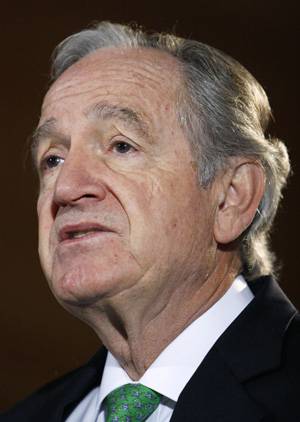Harkin comments on winning Iowa

U.S. Sen. Tom Harkin, D-Iowa, speaks to supporters as he formally announces his bid for a fifth term in the Senate, Monday, March 10, 2008, in Cumming, Iowa. AP Photo/Charlie Neibergall
November 4, 2008
DES MOINES (AP) — Democratic U.S. Sen. Tom Harkin won a fifth term in office Tuesday by defeating Republican Christopher Reed, a Marion businessman who was making made his first bid for public office.
The Associated Press declared Harkin the winner as the polls closed at 9 p.m. The call was based on an analysis of voter interviews conducted for The Associated Press by Edison Media Research and Mitofsky International.
Harkin, 68, has been in Congress since 1974 and has become arguably the most successful Democratic politician in the state’s history.
“I think the message voters sent was they want change, they don’t want the status quo and they want Democrats to take the lead, but they also want us to reach across the aisle,” Harkin said in an interview with The Associated Press. “They want us to set the agenda.”
He built a huge edge in both polling and finances but still campaigned in the state intensely, saying he wasn’t taking anything for granted. That intensity was rewarded with an easy election and a short wait to claim his prize.
Harkin, of Cumming, won election to Congress in the Watergate election of 1974 and represented a southwest Iowa district for 10 years before winning a Senate seat in 1984.
In 1992, Harkin briefly sought the Democratic presidential nomination, but he quickly dropped from the race after a poor showing in early primaries.
His lengthy tenure in the Senate has made him a force to be reckoned with on a variety of issues, and he now heads the Senate Agriculture Committee. He used that post this year to shape a new farm bill that will lead to billions in subsidy payments flowing into Iowa and other farm states. The same measure includes nutrition programs, as well as incentives for farmers to improve conservation practices.
Since winning his Senate seat, Harkin has been a top target every six years for Republicans. The GOP has run three sitting congressmen against him, with all being defeated in November.
This time, the GOP was unable to recruit a big-name candidate to oppose Harkin, with Reed winning a tight three-way GOP primary for the Senate nomination.
Reed, a 36-year-old who runs a telephone answering business, was making his first try for public office. He took sharply conservative positions on virtually every issue, but he lacked the money to get his message out.
Harkin raised more than $8 million for the campaign, while Federal Election Commission reports showed that Reed had raised $46,000 by the end of September.
With his financial edge, Harkin was able to help out other Democrats.
The two rivals held no formal campaign debates during the race, but made one joint appearance on Iowa Public Television. In that meeting, Reed labeled Harkin an unrepentant liberal while Harkin cast himself as an experienced and senior senator able to deliver for the state.
















